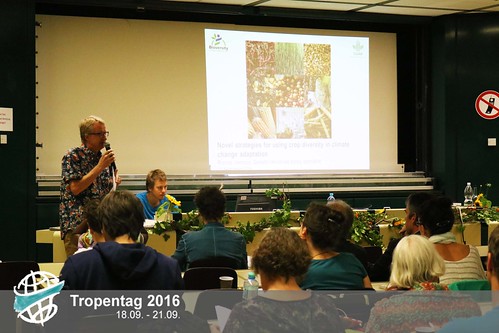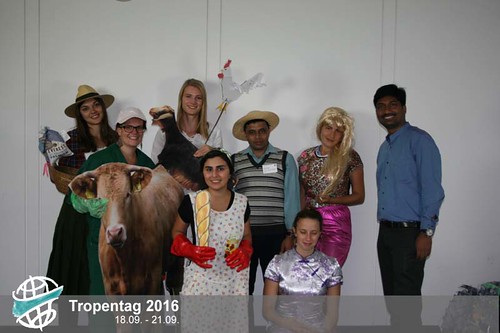Lang's blog
A Practical Handbook for Climate Change Adaption
Wed, 09/21/2016 - 12:18 — LangSeeds of resilients - A novel strategy to discover and use climate-adapted germplasm

At the moment, there are 11 seed banks in developing countries, and they are coordinated by CGIAR centres around the world. Nevertheless, farmers are often still far away from breeding progresses and have no access to diverse, locally adapted seeds. Building up a community driven, decentralized seed banks should be a one of the main priority in future development work.
Bioversity International tries to use crop genetic diversity to face rural challenges and foster adaptation to climate change. This is why a handbook, a resource box for resilient seed systems was compiled in order to assist scientists, plant breeders, farmers and the practitioners in the field. About 150 different stakeholders coming either from the research field or from farms in several countries have worked on this handbook for 3 years..
The strategy presented in the handbook combines climate and crop modelling tools and participatory research methods, and it has 8 steps:
Science and Practice – A Complex Relationship
Tue, 09/20/2016 - 17:30 — LangIn this year’s GIZ/EZ session, the linkages and the connectivity between research and development was discussed. How much research is necessary, and what type of knowledge and partnerships are needed to reach the final beneficiaries? - was the main question that arose their symposium.
Organic markets and certification – Participatory systems but not too much romance please
Tue, 09/20/2016 - 11:23 — LangTalking about the very interesting poster presentations, Tuesday's morning session started with a much striking symposium about the future of the organic market. The content of each presentation can be found online, that is why, here, I rather want to focus on the side questions and discussions that arose during the session.
The first critical point at issue coming up was about the length of a stay for conducting a scientific study and, especially, for developing statements. The chair of the session, Prof. Christian Vogl (BOKU University), recommended that sometimes it is better to formulate hypotheses or research questions instead of concrete statements and conclusions, especially when scientists are conducting a short-term project. In fact, within a few weeks, it does not seem very realistic to get an in-depth insight of any subject.
After the first two presentations, the topics shifted towards organic markets and cooperations. Pauline Deltour presented a study from Florianópolis, SC Brasil: “Short Supply Chains of Organic Food: Socioeconomic Emancipation of Family Farmers?”, showing that agricultural fairs (i.e. weekly farmer markets) present the most emancipatory (concerning high reciprocity and autonomy) potential to farmers, but, nevertheless, they are still too small. That is why the organic farmers in the region also need shops for selling their products in order to guarantee a permanency of income.
2016 student reporters: here they are!
Mon, 09/19/2016 - 15:32 — LangSince 2010, the team of Student Reporters has been sponsored by the initiated institution ATSAF e.V. that takes care of drawing the 12 team members from many different European Universities. They come from all around the world: Europe, Africa, North and South America, Asia! The team is in charge of spreading the conference material online in form of articles on a multi-author blog platform and Twitter, Facebook, Flickr, and YouTube, by so doing facilitating the communication within the scientific community and expanding Tropentag’s many voices. Let’s check their introduction video out!
Reflective Photobooth– A creative method to challenge detachments in today’s food system
Mon, 09/19/2016 - 14:34 — Lang
Background: There is a rising detachment in agrifood systems as, especially in industrialized countries, the direct experience and contact with farmers is little and the gap between consumers and producers is high. Because of little knowledge about agriculture, there is an increased importance of second-hand sources like mass media communication about farming. Unfortunately, the stereotypic representation on the media with inherited values and pictures of family farming often distances groups further.
The goal: Challenging media perspective of farmers with several practical methods on public conferences and seminars. An innovative new approach to discovering power relations and problems derived from different cultural and social backgrounds.
Conduction: Setting up a studio -> selecting costumes –> taking pictures -> talk and reflect about it.




